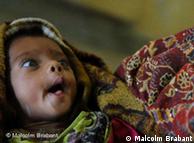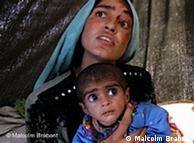Author: Malcom Brabant : 20.04.2011
 Großansicht des Bildes mit der Bildunterschrift: Malnourishment remains a problem among children
Großansicht des Bildes mit der Bildunterschrift: Malnourishment remains a problem among children
The effects of last year's flooding in Pakistan are painfully visible amongst the country's poorest people. Child malnutrition is rampant, and aid is slow to come as other world events overshadow the misery.
With the aftermath of the earthquake and tsunami in Japan and upheavals in North Africa and the Middle East grabbing headlines worldwide, aid agencies are struggling to keep a separate disaster in the public consciousness.
Child malnutrition in Pakistan constitutes "a humanitarian disaster of epic proportions," they warn.
Large swaths of nation were inundated by floods last July, forcing people in remote rural communities to seek assistance from organizations like the UN children's agency UNICEF. Pakistan still needs money to recover from the emergency, even as the floods' one-year anniversary approaches.
Statistics for the whole of Pakistan aren't yet available, but numbers from the southernmost and most afflicted Sindh province suggest 25 percent of children under the age of five are severely malnourished.
"It's truly as bad as I've seen in the worst emergencies in the world," Karen Allen, deputy director of UNICEF's permanent mission in Pakistan, told Deutsche Welle. "The floods just pushed people over the edge."
 Bildunterschrift: Großansicht des Bildes mit der Bildunterschrift: Aid organizations call the situation a 'humanitarian disaster of epic proportions'
Bildunterschrift: Großansicht des Bildes mit der Bildunterschrift: Aid organizations call the situation a 'humanitarian disaster of epic proportions'
The crisis is the consequence of a combination of factors including: extreme poverty, poor diet, poor health, exposure to disease, and inadequate sanitation and hygiene. A lack of education makes things worse.
"I didn't know my child had died," a woman in a tent camp for flood victims said of her 1-year-old daughter Khallida. "I thought she'd gone to sleep. Then I saw my mother preparing a funeral shroud. And they gathered to take the baby for burial."
In another part of Sindh province, Zeba Iqtiyar, a mother of eight, has managed to save her four-month-old son Gulza from a similar fate.
She took Gulza to a UNICEF stabilization center, where staff assessed that he was on the cusp of severe malnourishment. Staff sent the pair back home to her small holding with a pack of high-nutrition formula designed to boost the infant's growth.
"I feed my baby rice, chick peas, pulses; sometimes plain bread," Iqtiyar told Deutsche Welle as chickens scratched in the dirt outside her mud hut. "We're poor. We eat what we can afford."
 Bildunterschrift: Großansicht des Bildes mit der Bildunterschrift: International awareness is lacking for a number of reasons
Bildunterschrift: Großansicht des Bildes mit der Bildunterschrift: International awareness is lacking for a number of reasons
Pakistan is estimated to need $2 billion (1.4 billion euros) to recover. Only half of that money was forthcoming. Kristen Elsby, UNICEF's communications chief in Pakistan, is one of those struggling to raise international awareness about the problem.
"Millions of people of children are greatly at risk from malnutrition," she told Deutsche Welle. "Babies are dying and mothers are at risk of dying during child birth."
http://www.dw-world.de/dw/article/0,,6504967,00.html
 Großansicht des Bildes mit der Bildunterschrift: Malnourishment remains a problem among children
Großansicht des Bildes mit der Bildunterschrift: Malnourishment remains a problem among childrenThe effects of last year's flooding in Pakistan are painfully visible amongst the country's poorest people. Child malnutrition is rampant, and aid is slow to come as other world events overshadow the misery.
With the aftermath of the earthquake and tsunami in Japan and upheavals in North Africa and the Middle East grabbing headlines worldwide, aid agencies are struggling to keep a separate disaster in the public consciousness.
Child malnutrition in Pakistan constitutes "a humanitarian disaster of epic proportions," they warn.
Large swaths of nation were inundated by floods last July, forcing people in remote rural communities to seek assistance from organizations like the UN children's agency UNICEF. Pakistan still needs money to recover from the emergency, even as the floods' one-year anniversary approaches.
Statistics for the whole of Pakistan aren't yet available, but numbers from the southernmost and most afflicted Sindh province suggest 25 percent of children under the age of five are severely malnourished.
"It's truly as bad as I've seen in the worst emergencies in the world," Karen Allen, deputy director of UNICEF's permanent mission in Pakistan, told Deutsche Welle. "The floods just pushed people over the edge."
 Bildunterschrift: Großansicht des Bildes mit der Bildunterschrift: Aid organizations call the situation a 'humanitarian disaster of epic proportions'
Bildunterschrift: Großansicht des Bildes mit der Bildunterschrift: Aid organizations call the situation a 'humanitarian disaster of epic proportions'The crisis is the consequence of a combination of factors including: extreme poverty, poor diet, poor health, exposure to disease, and inadequate sanitation and hygiene. A lack of education makes things worse.
"I didn't know my child had died," a woman in a tent camp for flood victims said of her 1-year-old daughter Khallida. "I thought she'd gone to sleep. Then I saw my mother preparing a funeral shroud. And they gathered to take the baby for burial."
In another part of Sindh province, Zeba Iqtiyar, a mother of eight, has managed to save her four-month-old son Gulza from a similar fate.
She took Gulza to a UNICEF stabilization center, where staff assessed that he was on the cusp of severe malnourishment. Staff sent the pair back home to her small holding with a pack of high-nutrition formula designed to boost the infant's growth.
"I feed my baby rice, chick peas, pulses; sometimes plain bread," Iqtiyar told Deutsche Welle as chickens scratched in the dirt outside her mud hut. "We're poor. We eat what we can afford."
 Bildunterschrift: Großansicht des Bildes mit der Bildunterschrift: International awareness is lacking for a number of reasons
Bildunterschrift: Großansicht des Bildes mit der Bildunterschrift: International awareness is lacking for a number of reasonsPakistan is estimated to need $2 billion (1.4 billion euros) to recover. Only half of that money was forthcoming. Kristen Elsby, UNICEF's communications chief in Pakistan, is one of those struggling to raise international awareness about the problem.
"Millions of people of children are greatly at risk from malnutrition," she told Deutsche Welle. "Babies are dying and mothers are at risk of dying during child birth."
http://www.dw-world.de/dw/article/0,,6504967,00.html











No comments:
Post a Comment